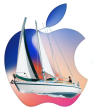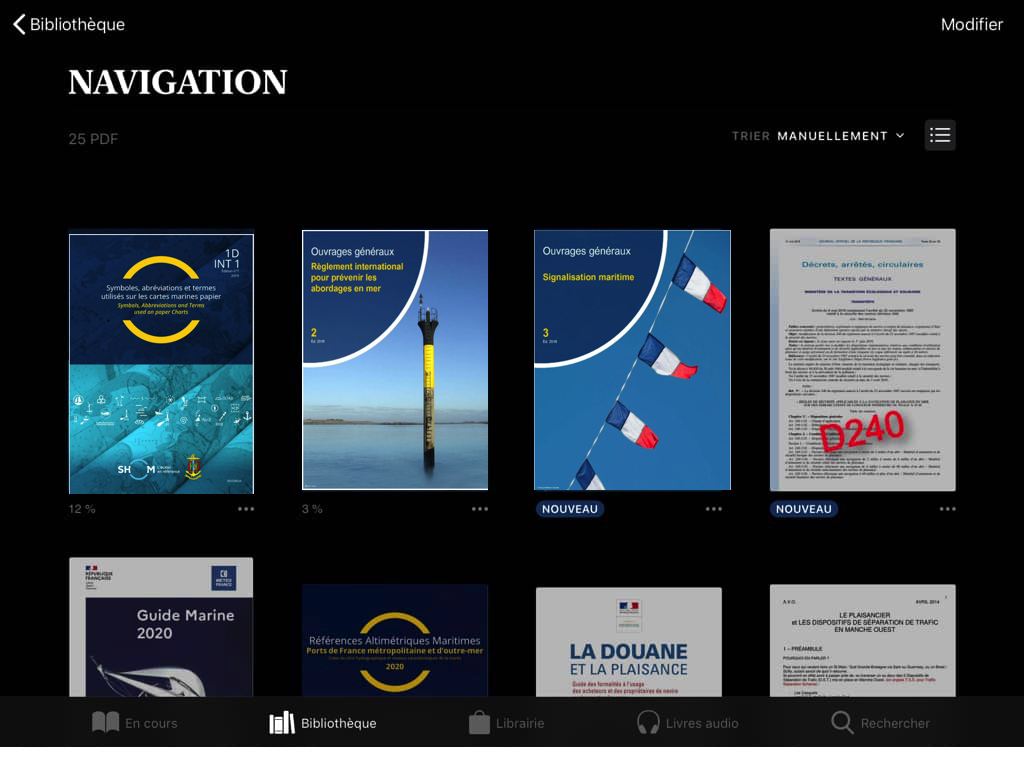(Article original 27 June 2018)
Since the publication of the division D240 replaced, applicable from 6 May 2019 (see my previous article), it is now official that mandatory nautical documents can be taken on board in digital form.
[Update 24/08/2020]
2.03.7 A way to know the times and tide coefficients of the day and area considered. This document is not required in the Mediterranean.
2.04.7 International regulations to prevent collisions at sea (COLREGS), or a textual and graphic summary, possibly in the form of adhesive liflets, or on electronic media and its reading device.
2.04.8 A document describing the marking system of the attended area , possibly in the form of adhesive liflets, or on electronic media and its reading device.
2.05.5 The lights book updated or available on electronic media and its reading device.
Most of them available now in free download, this allows a substantial saving of space and weight in the on-board library, and also savings ! Here is a quick inventory of official and private French documents., available in PDF format, can be saved in the library Apple Books for iPhone and iPad (and also on Android).
Documentation and works
The app Apple Books allows you to create personalized folders to store the documents you want to import.
• Books available on the website of the SHOM
 The SHOM opened partially to the’Open Data'. The catalog of digital products allows you to download a certain number of books for free in PDF format, which can then be opened in Apple Books. Some are free, others to pay. All you need to do is create an account.
The SHOM opened partially to the’Open Data'. The catalog of digital products allows you to download a certain number of books for free in PDF format, which can then be opened in Apple Books. Some are free, others to pay. All you need to do is create an account.
- Free : Mandatory works 1D, 2, 3, 1F
- Paid : Sailing instructions, Lights book, Radion Signals guide, Atlas of currents, etc,.
• Publicly available documentation
On website Legifrance you can download the entire document in PDF Division D240 published in the Official Journal (JORF).
• Books available from Météo-France
 Météo-France opens public access to its documentary portal. You can download for free many high quality documents about Meteorology in PDF format. It's up to you to browse the numerous entries on the site, we unearth rare pearls there.
Météo-France opens public access to its documentary portal. You can download for free many high quality documents about Meteorology in PDF format. It's up to you to browse the numerous entries on the site, we unearth rare pearls there.
The Guide Marine annual report from Météo-France. All means to get weather forecasts at sea, the devices, the frequencies, indispensable, especially since VHF became compulsory for navigation from 6 MN of a shelter (1st January 2017).
Applications
• Tides Table
 The essential tide.info to constantly have the SHOM forecasts for France with a particularly neat interface offering numerous options (threshold settings, draft, notifications, aso.). Free daily data, annual on progressive subscriptions.
The essential tide.info to constantly have the SHOM forecasts for France with a particularly neat interface offering numerous options (threshold settings, draft, notifications, aso.). Free daily data, annual on progressive subscriptions.
 Ayetides (iPhone) / Ayetides XL (iPad ) for those who need tide predictions all over the world, more than 12.500 stations, dont 160 French stations, valid until 2030. Updating the station database is frequent and completely free.
Ayetides (iPhone) / Ayetides XL (iPad ) for those who need tide predictions all over the world, more than 12.500 stations, dont 160 French stations, valid until 2030. Updating the station database is frequent and completely free.
–––



Thank you so much !
Only problem for digital data to be consulted online : have an internet or 3-4g connection . What is not acquired in many parts of the world . In the Caribbean, the hunt for accessible wifi spots that are not exhausted by too many connections is almost a daily obligation.
All data cited in this article can be downloaded, not available online. Just plan ahead.
Thank you Francis for this update. If you weren't there!
Dominique
Thank you Francis for this relevant information and very useful addresses which must have escaped many browsers, me first.
Sincerely
Joel
Centurion 40 Arawak
Hello Francis
I am new to your mailing list and I am very happy and satisfied with what found, for the nautical instructions is there an update to be made, and if so which of ours are 2005 but it is true that we are sailing in Greece and this has never been asked of us.
Thank you for your response
Daniel
The latest versions of the Sailing Instructions date from 2010 (INC2A,C2B, D3). But if you have the Marine Block in your area it is perfectly tolerated.
C’est bon je viens de réussir à installer « signalisation maritime 3C », peux-tu me donner des liens où je peux télécharger les autres PDF, stp ?
Thanks in advance
Le lien principal est dans l’article ! Il suffit de cliquer sur les rubriques « Ouvrages généraux » puis le lien “Tout voir“. Faudrait faire un effort 😉
Désolé je ne suis pas revenu éditer mon commentaire mais en fait j’avais trouvé. Encore merci pour ce que vous faites.
Par-contre c’est vraiment bien qu’ils acceptent les documents nautiques en version numérique ça prend moins de place.
Bon dimanche
Très intéressant et utile (comme d’habitude en fait 😉 ) , merci.
Didier Parez raises a very interesting question which also interests me.
Regarding this article from 31/12/14, I will add a little nuance …
Francis tells us that there is 3 types de documents : the obligatory ones, the essentials, the useful ones.
For my part I would say that there are 4 (and no 3) :
– the useful ones
– the essentials
– “obligatory in digital format but not necessary on paper”
– the “mandatory but it is better to have on paper because sooner or later the electronics break down”
Everyone will make their own classification because I don't think there is a universal truth.
Take the example of GPS. Everyone uses it, it is very widespread, inexpensive, and super precise. But the possible failures are :
– instrument failure (decreasing probability depending on the number of devices giving the GPS coordinates but which will not be zero)
– battery failure (ok, I admit it’s excessive)
– breakdown of what produces electricity (alternator, solar panel, …)
– breakdown of what transmits electricity to the batteries (charger)
– breakdown somewhere on the electrical circuit (cables, fuses)
– disruption (voluntary) of those who control GPS satellites
– provisional stop (from a few minutes to several weeks/months) on the side of GPS satellites (we remember the war in Iraq)
…
I certainly forget some.
For these reasons, the ephemeris + tables + sextant should be mandatory on board for navigation beyond XXX NM. (I assure you, I don't have one and I don't even know how to use it.).
What I am pointing out here is not GPS but the principle of relying on electronics which cannot be reliable. 100%.
P.S. : I am from the generation 80, I have always been immersed in electronics/computers/internet (everywhere, all the time) … but I wonder more and more.
And me from the generation 70, and completely agree with these precautions. See About alignments and sextant published in December 2009.
Hello Francis
What about the requirement for a logbook? (Maritime Affairs, assurances) ? If it is still obligatory, is an electronic edition permitted ? Can the trace of our route on a map reader be considered a logbook? ? What are the minimum mandatory data that must be there? (location, heading, speed, wind…). I admit that I don't have any on board, but I had my straps pulled up by the Polynesian customs boat (2 days before it comes into full swing on the Tuamotu, the customs boat not mine !).
Do you know an easy-to-use iPad logbook? ?
Even on the other side of the planet in New Zealand, your advice is precious.
Didier (See you later Alligator)
Hi Didier, nice summer in NZ ?
A logbook is always mandatory, it is the only document proving in the event of sea fortune. It will always be required by maritime authorities. Unfortunately, I have not yet found a satisfactory electronic logbook.. Most are US logbooks geared towards powerboating.. The ideal would be a navigation application that generates the data in a logbook in which all you have to do is enter comments. This was implemented in NavPlay, but this app has many defects which make it unusable (bugs, carto exclusive C-Map, chaotic development). But this idea is in progress with certain developers of my knowledge. Wait and see…